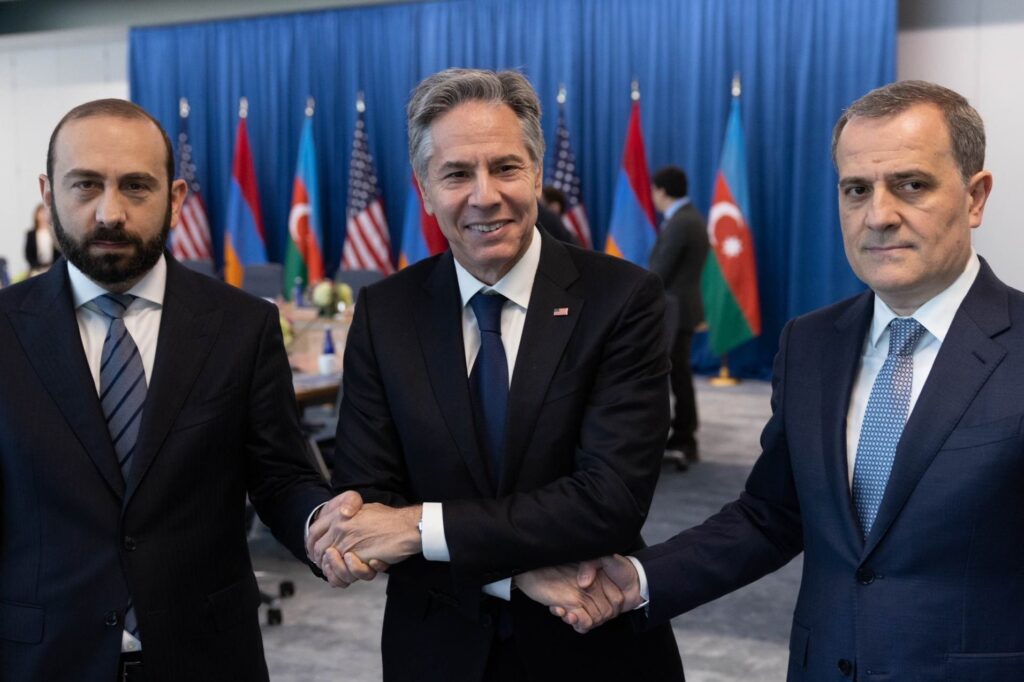High-level delegations from Armenia and Azerbaijan have begun US-mediated talks in Washington, reportedly aimed at normalising relations between the two countries.
The talks began on Monday with a meeting between the Armenian and Azerbaijani foreign ministers along with the US Secretary of State, Antony Blinken. Armenia’s Ararat Mirzoyan and Azerbaijan’s Jeyhun Bayramov followed up with a bilateral meeting later that day.
Following the meeting, Blinken tweeted that the talks would be held ‘this week’, while international media later cited US officials as saying they were expected to last for four days.
Hosting peace talks this week with Foreign Minister @AraratMirzoyan and Foreign Minister @Bayramov_Jeyhun at our new facility at the George P. Schultz National Foreign Affairs Training Center. Dialogue is key to reaching a lasting peace in the South Caucasus region. pic.twitter.com/LGYEkcq3ig
— Secretary Antony Blinken (@SecBlinken) May 1, 2023
The talks represent a diplomatic coup for Washington, as both the West and Russia have attempted to secure the role of mediator in the conflict.
Yerevan and Baku have not yet commented on the schedule or content of the talks.
Late on Monday, Voice of America cited US officials as saying that an ‘agreement on the normalisation of relations’ document was being discussed.
They also reported that the ‘rights of the ethnic minorities’ was on the agenda, likely a reference to the Armenian population of Nagorno-Karabakh.
Armenia has also said that the situation on the Lachin Corridor was discussed.
Competing mediators
The latest talks in Washington, which were announced just days beforehand, may prove to be significant given their duration and the makeup of the delegations taking part.
Negotiations between Armenia and Azerbaijan in late 2020 following the Second Nagorno-Karabakh War were originally mediated primarily by Russia, which had brokered the ceasefire.
However, following an Azerbaijani incursion into Armenia in May 2021 and subsequent escalations later that year, the US and European Union became more actively involved in the negotiations, organising meetings and advocating for a peace agreement.

Armenia refused a further Russian offer to host a meeting between the two sides after the blockade of the Lachin Corridor began in mid-December.
Russia has repeatedly dismissed Western involvement in the peace process, labelling it an attempt to kick Russia out of the negotiations. Moscow has argued that it has the most power to resolve the conflict as it has a military presence in the region. Roughly 2,000 Russian peacekeepers were deployed to Nagorno-Karabakh following the end of the Second Nagorno-Karabakh War.
According to Voice of America, US officials touched on Russia’s attitude towards Western mediation, stating that whether talks took place in Washington, Brussels, or Moscow, what was important was for both sides to ‘be able to talk to each other’.
‘Undermining the peace process’
The talks come as tensions surrounding the Lachin Corridor, the only route in and out of Nagorno-Karabakh, have continued to mount.
In a statement on Monday following the Washington talks, the Armenian Foreign Ministry gave little away, only mentioning that the humanitarian situation ‘resulting from the illegal blockade of the Lachin Corridor’ was discussed.

During a US State Department briefing on Monday, a spokesperson said the US had not ‘parsed [its] words about the need for the free flow of traffic and people and commerce through the Lachin Corridor’.
The US has condemned the blockade of the Lachin Corridor, calling for free movement of vehicles to and from Nagorno-Karabakh, which has been suspended since 12 December, to be restored.
Prior to the Washington meetings, Blinken spoke by phone with both countries’ leaders.
According to the US readout of the calls, Blinken called on President Aliyev to reopen the Lachin Corridor, stating that a recently installed Azerbaijani checkpoint ‘undermines efforts to establish confidence in the peace process’.
Frustrations with Moscow in Yerevan and Stepanakert have continued to grow over the situation on the Lachin Corridor. According to the November 2020 ceasefire agreement, Russian peacekeepers were to control the corridor.
On Monday, Alexander Lentsov, a former advisor to Russian Defence Minister Sergey Shoygu, recently appointed head of the peacekeeping mission, promised to update the authorities in Nagorno-Karabakh on the results of negotiations with Azerbaijan planned for this week.




 2 May 2023
2 May 2023



